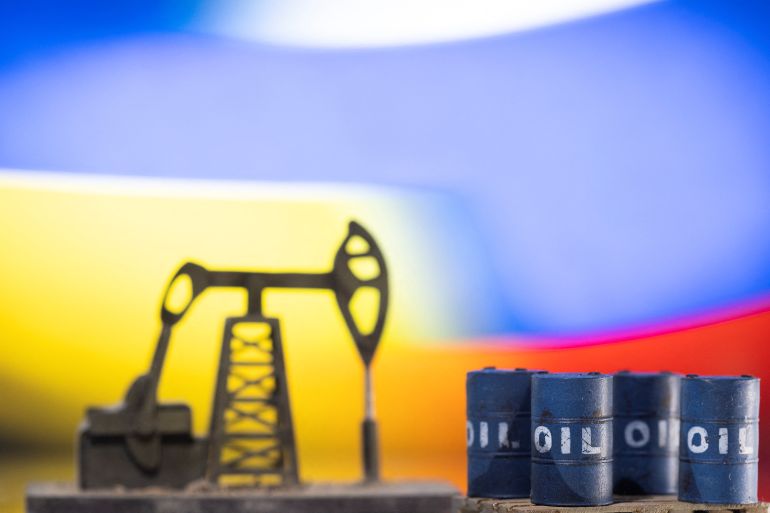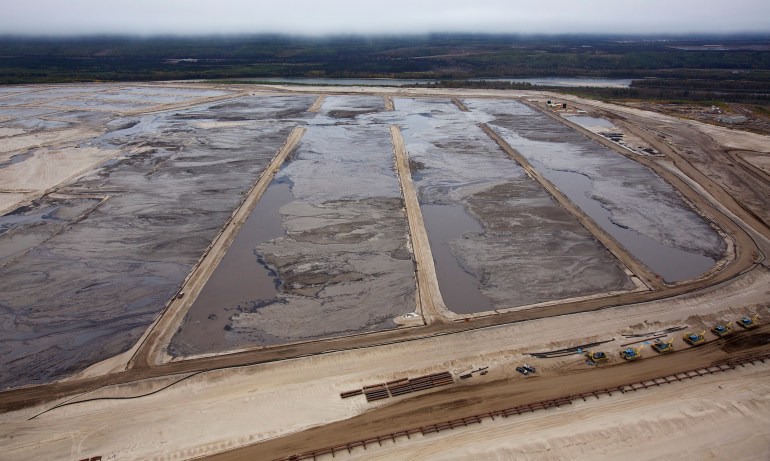Canada’s ‘petro-provinces’ see opportunity in Russia-Ukraine war
Amid calls to ban Russian oil and gas, environmentalists slam pro-oil ‘opportunism’ in Canada and call for energy transition.

Montreal, Canada – As efforts ramp up to broker a ceasefire and bring an end to nearly two weeks of Russian attacks on Ukraine, calls have been growing internationally to ban oil imports from Russia as a way to exert pressure on President Vladimir Putin to end the war.
United States President Joe Biden on Tuesday announced a ban on US imports of Russian oil and gas. It was unclear whether Europe, more energy-dependent on Russia than the US, would follow suit.
Keep reading
list of 3 itemsOil prices soar, stocks tank as Russia-Ukraine war rages
Can oil and China help Russia survive Western sanctions?
That is where Canada’s oil industry lobby groups and pro-oil politicians are now hoping to step in, urging countries to choose what they describe as Canadian “ethical oil” over Russian “conflict oil” reserves.
But environmentalists, rights advocates and other experts have denounced attempts to expand fossil fuel projects in light of the war in Ukraine, saying the conflict should instead hasten a global energy transition to respond to the climate crisis.
“We’re seeing once again the fossil [fuel] lobby seizing upon a crisis with horrific human consequences to promote its destructive agenda and double down on fossil production expansion,” Caroline Brouillette, national policy manager at Climate Action Network Canada, told Al Jazeera. “It’s been absolutely distressing to see some politicians echo this grotesque spin.”
Push to fill demand
Right-wing Alberta Premier Jason Kenney, a staunch defender of the oil industry and backer of major pipelines, has been at the forefront of the push to fill Europe’s oil and gas needs as it tries to move away from Russian supplies. Europe imports a large share of its natural gas from Russia.
“We have been blessed, as a rights-respecting liberal democracy, with the third-largest energy reserves on the face of the earth. That can be a force for good by allowing us to displace conflict oil from Russia and other dictatorships,” Kenney said last week.
Andrew Furey, the premier of Newfoundland and Labrador, also called for federal approval of a major oil extraction project off the Newfoundland coast, saying “we have the product the world needs now more than ever before”.
And at the federal level, Conservative Party MP Michael Chong put forward a nonbinding motion late last week calling on the Canadian government to support fast-tracking pipeline projects to the Atlantic coast in an effort to “displace Russian gas in Europe”.
But the idea that Canada can solve European energy insecurity with Canadian oil and gas does not make sense on basic market or economic grounds, said Angela Carter, an associate professor of political science at the University of Waterloo and expert on Canadian environmental policy.
We need to understand that energy is vital not only to our economy, but also security –and Europe’s.
Russia understands this. The EU understands this. The government needs to understand this.
#cdnpoli pic.twitter.com/jsYPCVmWee— Michael Chong 🇨🇦 (@MichaelChongMP) March 3, 2022
“It’s unrealistic to believe they’re going to somehow replace Russian supply,” Carter told Al Jazeera, in large part because the European nations importing Russian fossil fuels are focused on reducing their dependence. On Tuesday, the European Commission said it would move to increase Europe’s energy independence while reducing its imports of Russian supplies.
Russian oil and gas
Russia is the third-largest oil producer in the world behind the US and Saudi Arabia, according to the International Energy Agency (IEA). Last year, Russian oil accounted for approximately 34 percent of OECD Europe imports, the IEA has said, while Russian natural gas accounted for about 45 percent of European Union gas imports and nearly 40 percent of the bloc’s total gas consumption.
While they have imposed a slew of other economic sanctions on Russia, Western governments have hesitated to hit the country’s oil-and-gas sector amid fears that doing so could send prices soaring. Already, the price of a barrel of crude has increased significantly.
But as Russian attacks on Ukrainian cities continue, rights advocates and others are calling on countries around the world to stop importing Russian oil and gas in an effort to end the bloodshed, saying Putin’s government is using fossil fuel profits to fund and continue the war.
“Nobody is under any illusions anymore. Russia’s use of its natural gas resources as an economic and political weapon show Europe needs to act quickly to be ready to face considerable uncertainty over Russian gas supplies next winter,” IEA Executive Director Fatih Birol said in a statement, urging Europe to end its dependence on Russia.
That was echoed by the Canadian environment minister, Steven Guilbeault, who told Canada’s National Observer last week that “the solution to global energy problems is not to increase our dependency on fossil fuels” – but rather to reduce oil and gas dependence, “regardless of where it’s coming from”.
‘Dismaying’
Canada, home to the tar sands of northern Alberta, produced 5.23 million barrels of oil per day in 2020, the US Energy Information Administration said, making it the fourth-largest oil producer in the world after Russia, Saudi Arabia and the US.
For years, pro-oil Canadian politicians have pushed to expand fossil fuel projects while rejecting criticism from Indigenous leaders, environmentalists and rights activists who said the tar sands – which require one of the most polluting ways to get oil out of the ground – were harming communities and accelerating the climate crisis.
Carter said it is “dismaying that the ‘petro-provinces’ – Alberta and Saskatchewan and Newfoundland and Labrador – would try to take advantage of the immense suffering of the Ukrainian people by trying to profit off of energy insecurity”.

“What the ‘petro-provinces’ are trying to do by throwing more fossil fuels at this problem is – it’s exacerbating another massive humanitarian crisis, which is climate crisis,” she added.
The push towards renewable sources of energy has sped up in light of recent international summits and reports calling for drastic change to stave off the devastating effects of climate change. “Delay means death,” United Nations Secretary-General Antonio Guterres said late last month at the release of a new study by the UN’s Intergovernmental Panel on Climate Change.
“We know that fossil fuels are destroying the stability of the climate and we know that dependence on foreign sources of oil make us vulnerable to political and economic and military blackmail,” said Peter Gleick, a climate, water and energy scientist and senior fellow at the Pacific Institute in California.
Gleick said the quickest and smartest way to reduce dependence on Russian oil is to reduce overall demand for fossil fuels globally, “not to try and boost production of something we know we ought to already not be producing”. That means more conservation and efficiency in the short term, he told Al Jazeera, and then in the long run, expanding non-carbon sources of energy, such as renewables.
“So if anything,” he said, the Ukraine crisis is “a far better opportunity to push non-fossil fuels overall, rather than trying to increase our reliance on just somebody else’s fossil fuels”.
The Russia-Ukraine war isn't a war over fossil fuels, but fossil fuels are a weapon being used in the war.
Take away dependence on fossil fuels and we take away vulnerability to political, military, and economic blackmail and violence.#EndFossilFuels— Peter Gleick 🇺🇸 (@PeterGleick) March 7, 2022
Political aims
Yet that hasn’t stopped Canadian politicians from using the conflict to advocate for more oil and gas projects.
“Canada is the world’s fifth-largest natural gas producer, but we are unable to get natural gas to tidewater to provide assistance to European democracies,” Chong, the Conservative MP, said in the House of Commons last week. “We cannot get natural gas to tidewater because we cannot get pipelines built, and that inability … is not only impacting our economy, it’s now threatening our security and defence here at home, and that of the defence and security of Europe.”
Brouillette at Climate Action Network Canada said Chong’s comments are “disconnected” from what Europe is planning. “Europeans have not asked for more fossil [fuel] supply coming from Canada. This is rather the Canadian fossil fuel industry instrumentalising a crisis with disastrous humanitarian consequences, and unfortunately politicians echoing that grotesque spin,” she said.
Cam Fenton, Canada team lead at environmental advocacy group 350.org, said conservative lawmakers will never “miss an opportunity” to push for Canadian fossil fuel expansion. But he questioned whether the goal is really to build projects.
“I think their goal is to rouse a populist anger that somehow the decisions this government has been making around climate are contributing to rising gas prices,” Fenton told Al Jazeera. In that sense, they are using an “old political playbook”, he added. “This is really about, can you get people pissed off at the current government, and can it be enough” to garner more political support.